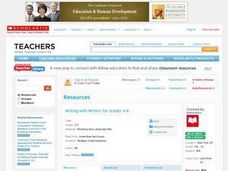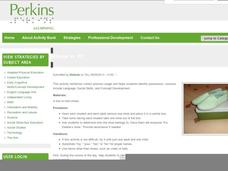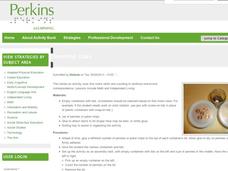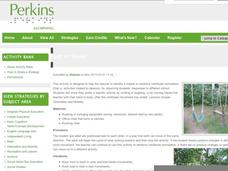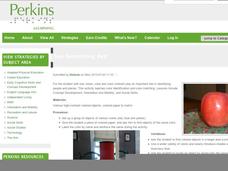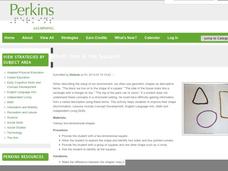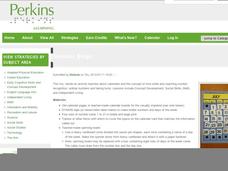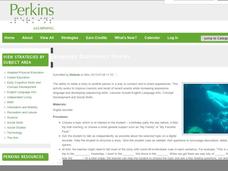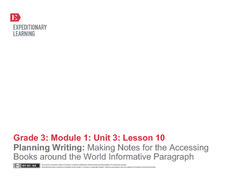Curated OER
Write with Writers
Write and work with authors on the Scholastic Website to promote the recognition of various genres. Young writers will participate in activities based on the type of writing such as biography, descriptive, folktales, mystery, news, and...
Curated OER
How To Use the Six Traits of Writing
Use these reference tools to plan and organize the Six Traits of Writing Program.
Curated OER
Children Around The World
Students read a multicultural book called "This Is the Way We Go to School" by Edith Baer and Steve Bjorhman. They become culturally aware of the different nationalities around the world and different ways that they may do things on a...
Perkins School for the Blind
Build a Word
Get out those scrabble tiles and a braille tape labeler because today we are playing a build-a-word game! Label several sets of scrabble tiles using the braille labeler, place them in a box, and have children take turns pulling letter...
Perkins School for the Blind
Memory
When you are blind, your hands become your eyes, so learning how to discriminate between various objects through touch is a very important skill. Make a memory game by gluing common items onto cardstock. The kids feel, identify, and then...
Perkins School for the Blind
Taking Turns
For small children or learners with disabilities, learning to wait patiently and taking turns is very important. In pairs, two children with visual impairments take turns asking for, waiting for, and playing with a musical toy. Each turn...
Perkins School for the Blind
Teach Personal Possession and Pronouns with Simple Objects
The concept of what is mine and what is yours seems simple, but for children with visual impairments, it is a concept that must be taught. Each child in the class puts one of their shoes in a single box, they take turns choosing a shoe,...
Perkins School for the Blind
Initial Consonant Activity
Bingo is a super fun game and can be used to reinforce a vast number of recognition skills. These bingo cards are prepared by constructing nine squares, each delineated with raised Wikki Stix or gluedyarn and containing a braille...
Perkins School for the Blind
Conversation Skills
It is so important for learners with multiple disabilities to learn how to communicate for both social and functional reasons. Each child will choose a topic from the list and generate five questions related to that topic. They'll split...
Perkins School for the Blind
Put the Shoe on Your Foot
Promote clothing identification, body part identification, and dressing skills acquisition with a fun and lively game. Each child takes turns grabbing a clothing item from the central clothing box. As he puts the item on, he sings, "Put...
Perkins School for the Blind
Circle Time
Oftentimes children or teens with one or more disability are reluctant to participate in whole-group activities. Foster good participation, verbal expression, and social skills through daily circle time activities. Each day you and your...
Perkins School for the Blind
Personal Information
"Hi, how are you? My name is___." Seems simple enough but it's not always that easy to recall and relate factual information about yourself. Learners with multiple disabilities practice memorizing and relaying personal information about...
Perkins School for the Blind
Counting Cups
Teach one-to-one correspondence, fine motor, and counting skills to your learners with visual disabilities. Included are a set of activity suggestions, which are useful when teaching a variety of different early math skills. Braille,...
Curated OER
Fast or Slow?
Vestibular stimulation is an action or activity relating to balance and motion. To find out what kind of vestibular stimulation your learners with multiple disabilities enjoy best, follow these simple suggestions. You engage the child in...
Perkins School for the Blind
Rolling Along
I cannot stress enough how important orientation and mobility training is for learners with visual impairments. To practice maintaining their balance, as well as work on building the confidence to participate in recreational sports,...
Perkins School for the Blind
Beanbag Toss
Why is learning how to catch and toss so important? If one has visual impairments, learning this basic skill will help him increase orientation and mobility, coordination, and cognitive development,. Mastery of this skill will also mean...
Perkins School for the Blind
A Visit to the Doctor
Going to the doctor's office may be a source of stress and uncertainty for some children. Help your learners with special needs discover what to expect at and how to cope with their next trip to the doctor. They explore real medical...
Perkins School for the Blind
I'm Thinking Of...
Learning how to describe an object or a person is a great way to develop verbal and written expression. Learners with special needs improve their verbal expressive skills and concept development skills while playing a guessing game. The...
Perkins School for the Blind
I See Something Red
For learners with low vision, the ability to identify colors is an important skill that will help them identify people and places. Groups of brightly colored objects are placed around the room. The child is then given a colored paper and...
Perkins School for the Blind
Mix and Match
Sorting and matching are skills that have all kinds of applications. Learners with low, but useable vision work to match an object to an object, an object to a picture, and a picture to a picture. This will help them identify objects...
Perkins School for the Blind
Which One is the Square?
Children who are blind need to constantly be engaged in building conceptual understandings of the world around them. This activity will help them grasp the concept of shape, identify shapes, and consider shapes as they are used to...
Perkins School for the Blind
Calendar Bingo
While this activity was designed for students with special needs, it could be used with any group learning about the calendar or days of the week. Old calendar pages become the bingo board, and numbers 1 through 31 become the numbers...
Perkins School for the Blind
Language Experience Stories
Here is a great way to bring core content to your special education classroom. Included is a set of instructional ideas intended to help learners increase their verbal and written expression through storytelling. Tape recorders, story...
EngageNY
Planning Writing: Making Notes for the Accessing Books Around the World Informative Paragraph
Encourage your young writers to thoughtfully plan and organize their work. First, model how this is done and vocalize your thought process as you work. Next, create a class list of strategies that they can use during independent writing...


